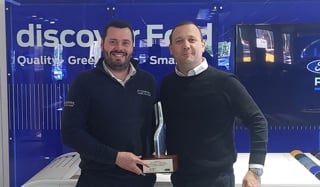The Secretary of State for Business, Innovation and Skills, the Rt Hon Dr Vince Cable MP, has launched a new project at Ford’s Dunton Technical Centre to help bring new generation low-CO2 engine technologies to market.
The ACTIVE (Advanced Combustion Turbocharge Inline Variable Valvetrain Engine) project is one of a number of initiatives supported by the APC (Advanced Propulsion Centre), which has been set up by the Automotive Council, as the focus of a joint industry and government strategy that will help the UK accelerate its leadership in advanced propulsion development and production.
The ACTIVE project is a multi-million pound investment by government and industry and is part of £1 billion that the APC will channel into the UK automotive industry over the next decade.
ACTIVE is centred on Ford’s 1.0-litre EcoBoost engine, the International Engine of the Year in 2012 and 2013.
The project will accelerate the introduction of future-generation low carbon technologies, including advanced turbocharging, advanced combustion system development and variable valvetrain technology, targeting substantial CO2 savings.
Project work will be carried out at various partner locations throughout the UK with key activities coordinated from Ford Dunton. Eleven partners included in the consortium are Ford, Continental, Schaeffler, UEES (Unipart Eberspacher Exhaust Systems), University of Bath, Loughborough University, University of Bradford, University of Nottingham, BP, Cambustion and AP Raicam (Automotive Products).
Business Secretary Vince Cable, said: "We're backing this research and development project to help the UK stay at the forefront of low carbon engine technology. The next generation of cars, buses and diggers will be powered by radically different technologies and I want them to be developed here in Britain.
“To capitalise on the success of our motor industry these projects will be the first of many to receive funding from the new £1 billion Advanced Propulsion Centre (APC) which we set up to turn technologies into products. The Government's industrial strategy is giving business the confidence to invest, securing high skilled, long term jobs and a creating a stronger economy.”
Tony Pixton, APC Chief Executive, said: “These new UK-based R&D partnerships are important beyond the scope of the ACTIVE and other projects we are announcing today, by stimulating further collaborations and growth in R&D and the supply chain for low carbon technologies in the UK.”
Mark Ovenden, Ford of Britain chairman and managing director, said: “As well as benefitting UK industry, this project will see direct benefits for consumers through even further improved engine efficiency - reduced CO2 emissions and improved performance.”
ACTIVE brings Ford's global R&D resources and some of Europe's top Tier 1 suppliers to the UK to develop advanced technologies with engineers at Ford's Dagenham and Dunton Engineering Centres and four of the UK’s leading automotive research universities.
Engineering and development of the 1.0-litre EcoBoost engine was centred at Ford Dagenham and the popularity of the engine has seen more than 34 per cent of UK Ford customers select this as their petrol engine of choice in its various applications, which currently include the Ford Fiesta, Ford B-Max, Ford Focus, Ford C-Max and Ford Transit Connect.





















Login to comment
Comments
No comments have been made yet.